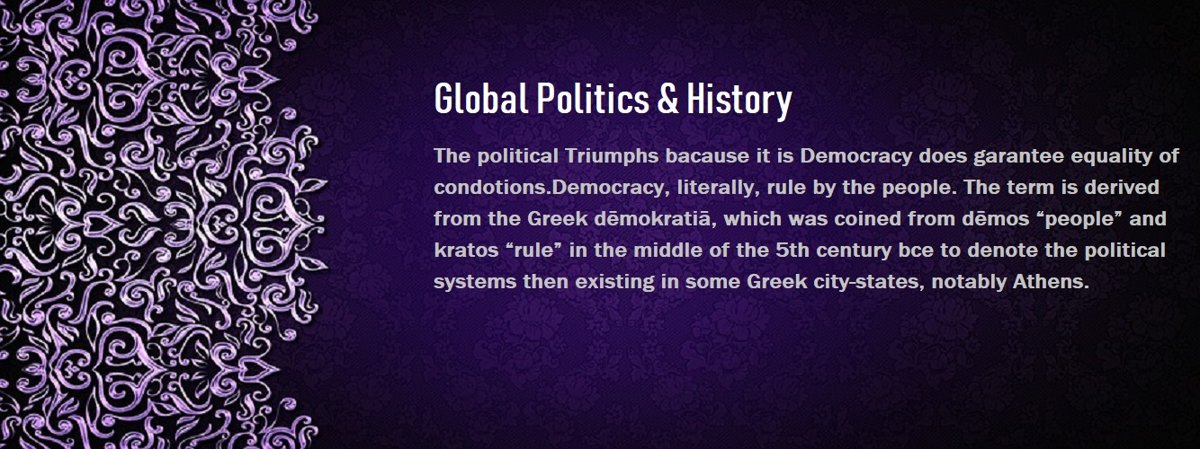ROHINGYA CRISIS: DEMOCRACY DOESN'T WORK IN MYANMAR, THE MILITARY - BACKED LAWMAKERS ARE CASTIGATING THE COMMISSION AS AN AFFRONT TO THE CITIZENRY,CLAIMING THAT IT IGNORES THE SOVEREIGNTY OF THE STATE.WHAT HAS HAPPENED TO HUMANITY ICON AUNG SUN KYI OF MORALITY?
 Aung
San Suu Kyi has been under fire internationally for her public silence
about a military crackdown in Myanmar’s Rakhine state that has seen
nearly 700,000 of the Muslim Rohingya minority flee to Bangladesh.
Aung
San Suu Kyi has been under fire internationally for her public silence
about a military crackdown in Myanmar’s Rakhine state that has seen
nearly 700,000 of the Muslim Rohingya minority flee to Bangladesh.
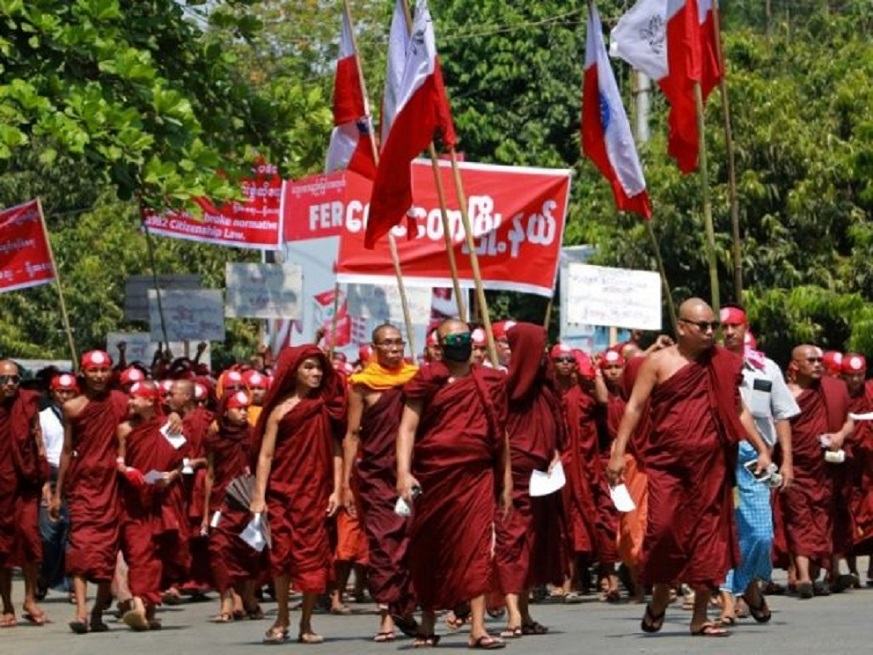
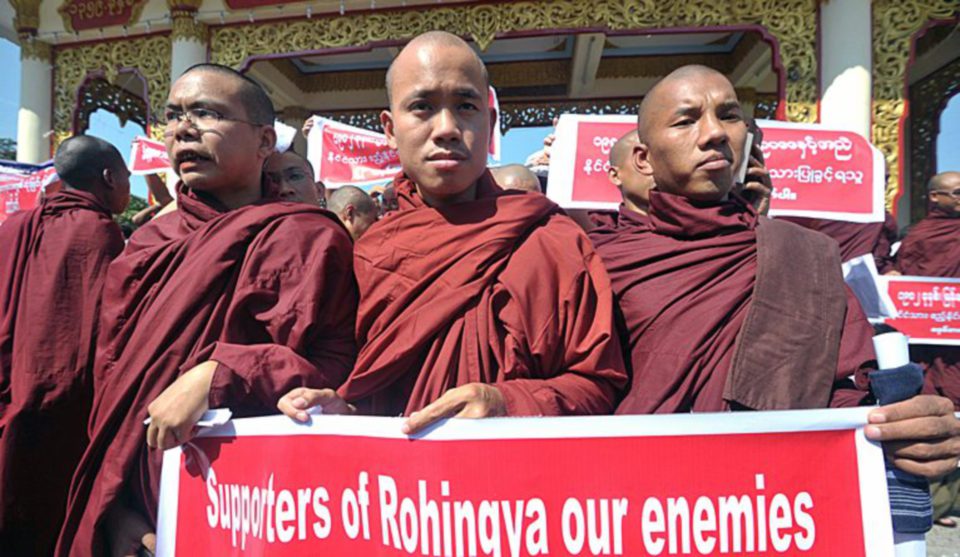
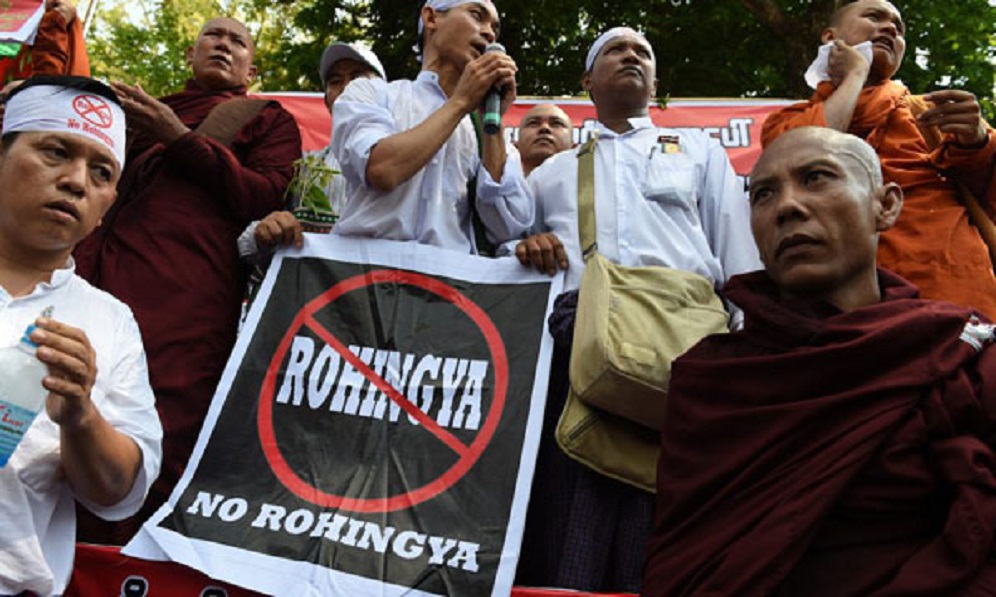 The
leader of the Buddhist atrocities is Buddhist monk Ashin Wirathu, who
says that he is just trying to protect Burma from Muslims. He calls his
movement the “969” movement, where 969 is a historic Buddhist sign,
referring to the nine qualities of Buddha, the six qualities of Buddha’s
teaching, and nine qualities of the Buddhist community. 969 is supposed
to promote peace and happiness, although Wirathu’s 969 movement is a
vehicle promoting violences.
The
leader of the Buddhist atrocities is Buddhist monk Ashin Wirathu, who
says that he is just trying to protect Burma from Muslims. He calls his
movement the “969” movement, where 969 is a historic Buddhist sign,
referring to the nine qualities of Buddha, the six qualities of Buddha’s
teaching, and nine qualities of the Buddhist community. 969 is supposed
to promote peace and happiness, although Wirathu’s 969 movement is a
vehicle promoting violences.
How do we respond to another genocide in the 21st century? First, we witness. Then, we act in solidarity. Solidarity requires our government to recognize this as genocide.The Rohingya are a largely Muslim ethnic minority in Myanmar at the center of a humanitarian catastrophe. But the Myanmar government won’t even use the word “Rohingya,” let alone admit they’re being persecuted. Instead, the government calls them Bengalis, foreigners, or worse, terrorists.This difference between these two terms Rohingya and Bengali is crucial to understanding the crisis unfolding in Myanmar, where more than 500,000 Rohingya have recently fled following a government crackdown and which has been called a “textbook example” of ethnic cleansing by the top United Nations human-rights official. Many of those ended up sheltering in makeshift camps in Bangladesh, telling tales of the killings, rape, and massacres.Before the massacres, there were thought to be around 1.1 million Rohingya living in the country. The Rohingya have existed in Myanmar a Buddhist majority country for centuries. It was known as Burma under British colonial rule (from 1824-1948) and there was significant migration between today’s Myanmar, India, and Bangladesh. Once Burma won independence in 1945, the government passed the Union Citizenship Act , which detailed the ethnicities “indigenous” to Myanmar. The Rohingya were not considered to be one of the country’s 135 official ethnic groups.That said, the Rohingya were able to carve a place for themselves in newly independent Burma; with some serving in parliament and other high offices. And their ethnicity was included in the 1961 census.The situation quickly deteriorated for the Rohingya, however, following the 1962 military coup, when the government driven by Bamar-supremacist ideology (paywall) gave fewer official documentation to the Rohingya and refused to fully recognize new generations of the Rohingya population. In 1974, all citizens in Burma were required to get national registration cards, but the Rohingya were only allowed to obtain foreign registration cards.By 1982, a new citizenship law was passed that prevented Rohingya from easily accessing full citizenship, rendering many of them stateless. In 1989, the country was renamed Myanmar.It’s not just the Rohingya, outbreaks of violence have affected non-Rohingya Muslims across Myanmar. Certain extremist monks have intensified the Islamophobic rhetoric in the country, claiming Myanmar’s dominant Buddhist faith is under threat from Muslims (pointing to Afghanistan and Indonesia as examples). These monks were crucial in passing “race and religion” laws that targeted Muslims and attempted to stem their population growth.In 2009, the Rohingya as “probably the most friendless people in the world” and it’s easy to see why. In 2015, the plight of the Rohingya was brought to the forefront when boats packed with Rohingya migrants were left stranded at sea. The Rohingya collectively dubbed across international media as “boat people”were stuck because they were turned away from a number of Southeast Asian countries, including Malaysia, Indonesia, and Thailand. Unwanted in Myanmar, the Rohingya are also often rejected from the countries they hope to flee to.Since the late 1970s, nearly one million Rohingya are estimated to have fled Myanmar. The demand, in a statement issued on November 28, said a meeting of the NDSC was needed because the crises had put the country’s territorial sovereignty was at stake.It is hardly a secret that the ruling National League for Democracy and an overwhelming majority of the people do not like the 2008 Constitution, which provides for the military to hold 25 percent of hluttaw seats and a majority on the 11-member NDSC. The NLD had promised to amend the constitution if it was elected.Section 417 of the constitution provides for the President to convene a meeting of the NDSC and order a national state of emergency if the Union faces potential disintegration or loss of sovereignty through violence. The NDSC comprises five senior military officers and six civilians, including President U Htin Kyaw and Daw Aung San Suu Kyi, in her capacity as foreign minister.However, the civilian cohort includes the vice presidents, one of whom is nominated by the military, giving the armed forces an effective majority. The NDSC holds legislative, executive and judicial powers during a state of emergency.Why did the 13 parties issue their statement calling for a meeting of the NDSC? Is the NLD government able to overcome the problems described in the statement? Is it probable that the Tatmadaw would try to return to the political stage? The 13 parties said a meeting of the NDSC was needed because the country was facing a crisis over the security situation in Rakhine and the fighting in northeastern Shan State. Their statement said the country’s territorial situation was at stake because of the situation in Rakhine. In Shan, the fighting between the Tatmadaw and the Kachin Independence Army, Ta’ang National Liberation Army, Myanmar National Democratic Alliance Army and Arakan Army has resulted in death and destruction and disrupted trade with China.The security operation in northern Rakhine began after Muslim militants attacked Border Guard Police posts in early October, leaving nine officers dead and seizing arms and ammunition. However, the attackers were armed only with swords and sticks, not with modern weapons.Bangladesh deserves praise for its response to the situation across the border in Rakhine. It has not interfered in Myanmar’s affairs and has cooperated in a good-neighbourly way. It has handed over militants and has promised it will never allow its territory to be used as a base for attacks against Myanmar. The cooperation from Bangladesh will help the Tatmadaw in its operation to restore peace and security to northern Rakhine sooner or later.In northeastern Shan, the KIA and its Northern Brotherhood allies said they launched their attacks in Muse and Kutkai townships to draw attention to recent “pressure” from the Tatmadaw. Although the Tatmadaw suffered casualties, there was no move by the Northern Brotherhood to seize towns or villages.The main objective of the attacks was to disrupt border trade and the movement of the people. The Tatmadaw is meeting its responsibility to restore law and order in the affected area. Myanmar is not in danger, or even on the brink of danger.State Counsellor Aung San Suu Kyi and Tatmadaw Commander-in-Chief Senior General Min Aung Hlaing meet occasionally, when the circumstances require it. The ministers of defence, home affairs and border affairs, all of whom are military officers and members of the NDSC, are consulted during cabinet meetings.Section 213(a) of the constitution says that the President has the right to take military action, in coordination with the NDSC, in the event of aggression against Myanmar.It is within the authority of the President to call a meeting of the NDSC. However, there is no need to do so at the moment. Myanmar is not being invaded and government ministers who are members of the NDSC, as well as senior members of the Tatmadaw, are closely following and discussing the national situation.The USDP is the creation of military dictators. A USDP government, comprised of former generals, led by President U Thein Sein and created by former dictator Senior General Than Shwe, took power in 2011 under the terms of the military-drafted 2008 Constitution.The NLD landslide in the 2015 delivered a humiliating defeat to the USDP and most of the other 12 parties that signed the statement. Could it be that in criticising the NLD government’s handling of the crises in Rakhine and northeastern Shan, and calling for a meeting of the NDSC, the USDP-led group is hoping for a U-turn to a military government? Is it possible that they want to reverse history and take Myanmar back to dictatorship?

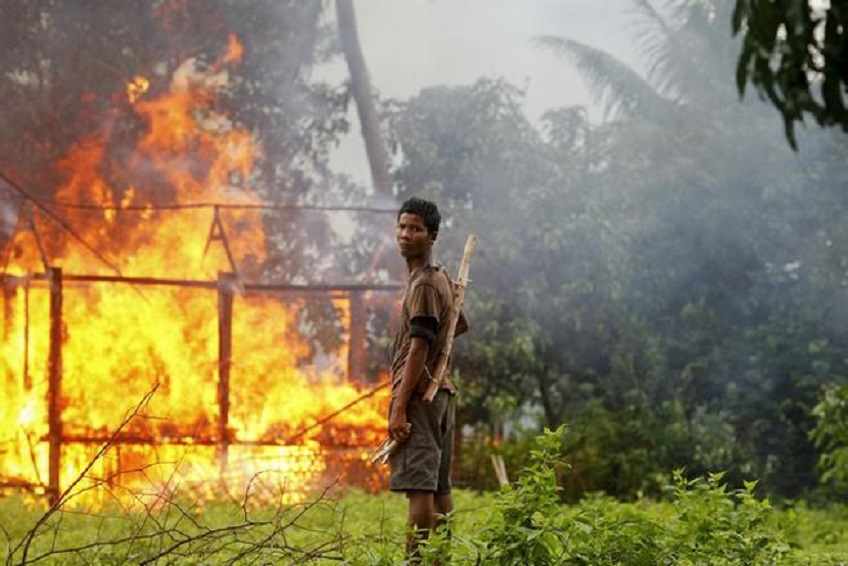
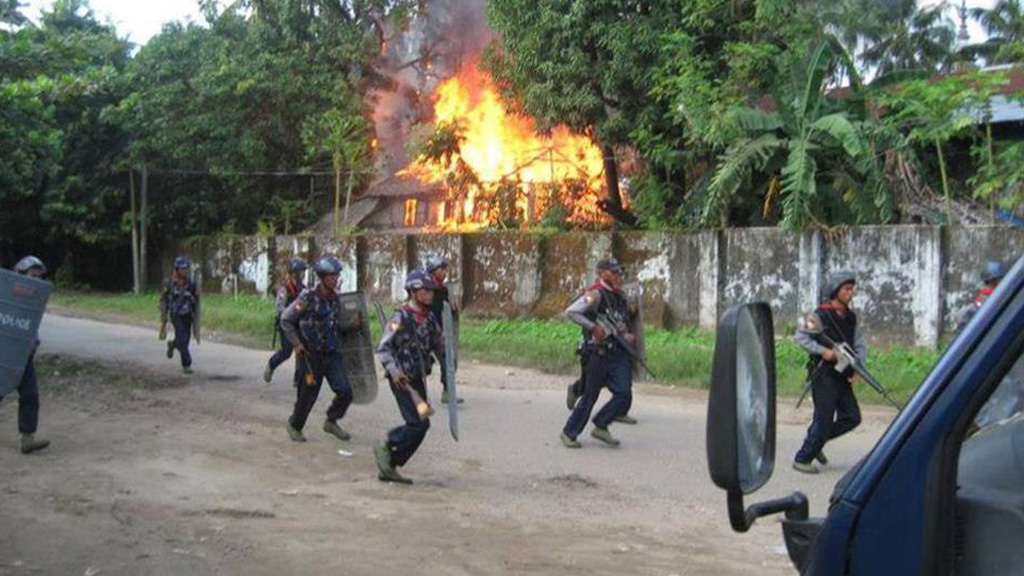
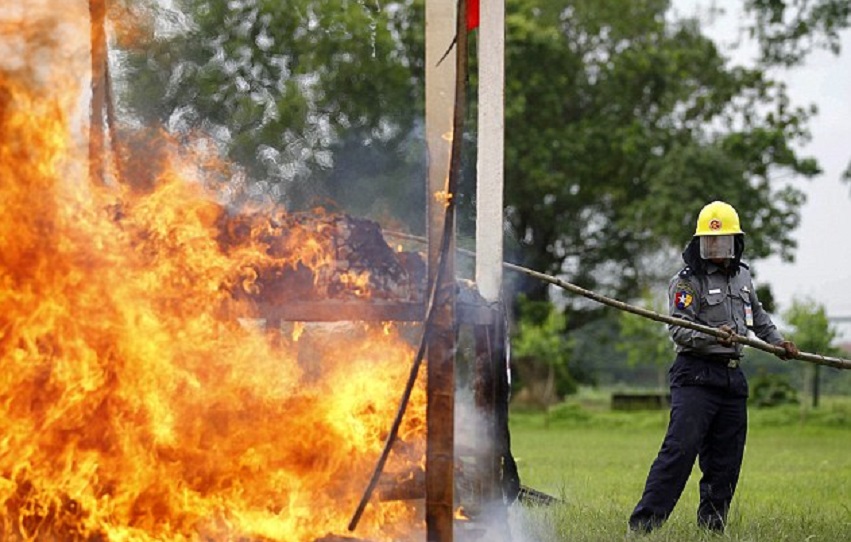 Rohingya
Muslims flee as more than 2,600 houses burned in Myanmar’s Rakhine.The
treatment of Myanmar's roughly 1.1 million Rohingya is the biggest
challenge facing leader Aung San Suu Kyi, accused by Western critics of
not speaking out for the Muslim minority that has long complained of
persecution.
Rohingya
Muslims flee as more than 2,600 houses burned in Myanmar’s Rakhine.The
treatment of Myanmar's roughly 1.1 million Rohingya is the biggest
challenge facing leader Aung San Suu Kyi, accused by Western critics of
not speaking out for the Muslim minority that has long complained of
persecution.
In the Burmese government’s rendition, the Burmese military-led murders, gang rapings, and village burnings which have led to more than 600,000 Rohingya fleeing to neighbouring Bangladesh were simply a retaliation for ARSA’s (Arakan Rohingya Salvation Army) attacks on military outposts .This is a diverting tactic that is meant to turn the international community’s attention away from the fact the Rohingya have been facing genocide for decades. Denied citizenship since 1982 in a land they have called home for centuries, the Rohingya have had little to no access to basic human rights, such as education and health care.The Burmese military cut off her breast. Then they stabbed her in the abdomen so many times her nari bhoori (intestines) could be seen. Then they stabbed her over and over again in the vagina,” the woman said quietly, as tears silently streamed down her face, referring to her neighbour.Under British colonial rule, the country’s Burmese-speaking majority population was largely excluded from middle-ranking and senior civil service roles. Indeed Indians and colonial Britons imported from the Indian sub-continent were recruited to the civil service while members of Burma’s many ethnic minorities made up much of the police and the army.One reason for this was that, although Burma formed part of British India, its Burmese-speaking heartland was one of the last regions to be conquered and incorporated into the Raj.Consequently it had far fewer western-educated, English-speaking inhabitants than India. Also, the Depression of the 1930s destroyed the embryonic Burmese middle class – the class that would otherwise have laid the foundations of civil society.Another factor behind the military’s strength is the Burmese nationalist fear of the disintegration of the country. In the 17th–19th centuries, prior to the British conquest, the kings of the Burmese-speaking lowland region had expanded the size of their state by assuming at least nominal control over vast areas of non-Burmese-speaking territory.Indeed, as a direct result of that process, around two-thirds of Burmese territory is still inhabited by non-Burmese native-speaking minorities who account for around a third of Burma’s total population.There are dozens of separate ethno-linguistic minorities in Burma – the largest being the five million-strong Shan, the four-million strong Karen, the two-million strong Arakanese and the Mon, Chin, Karenni and Kachin peoples.Nationalist fears of the disintegration of the country have been bolstered by numerous ethnic minority armed insurgencies, two of which (the Karen and Shan revolts) continue today. Immediately post-independence, the Burmese government faced more than a dozen armed rebellions and even today the central government’s writ does not run in around five to 10 per cent of Burma’s territory.Nationalist fear of the disintegration of the Burmese state is integrally linked with a parallel fear of foreign intervention – a fear that has generated an unusually high level of xenophobia among the military.Certainly Burma has suffered a substantial number of foreign invasions and conspiracies – from the Chinese invasions of the 1760s through to the three Anglo-Burmese wars of the 19th century, Japan’s refusal to allow genuine independence (1943–45).In addition to all these historically-driven factors, military dictatorship has benefited from Burma’s ancient tradition of political deference. Many scholars see this as stemming, at least in part, from the Buddhist belief that political power (or indeed any other form of personal success) is a direct consequence of merit gained in previous lives. It is a form of meritocracy where karmic merit is ‘inherited’ through reincarnation.Today, with the military having yielded some powers to an elected government, Myawady Sayadaw peppers his sermons with references to human rights and interfaith understanding. But when it comes to Myanmar's most explosive political issue the army-led purging of Rohingya Muslims the outspoken monk becomes taciturn.Buddha loves all people and teaches us to try to resolve suffering, but we have a duty to protect our country at the same time.Democracy can be a messy business. Liberal democratic reforms often bring new freedoms and allow for the opening up of civil societies. But the freedoms that come with the transition from dictatorship to democracy not only empower the oppressed and marginalized, they also allow for new forms of repressions in the forms of resurgent nationalisms, xenophobia and hate speech masquerading as free speech. For transitioning states, liberal democracy comes with the good, the bad and the ugly. The real challenge is how to manage the contradictory freedoms that democracy unleashes.The government of Myanmar under the leadership (even if nominal) of Nobel Peace laureate and democracy icon Aung San Suu Kyi has been involved in the systematic ethnic cleansing of the minority Muslim Rohingya population. Under the excuse of cracking down on insurgents in the western Rakhine state, Myanmar’s military and security forces have engaged in rapes, killings and house burnings that have driven thousands of Rohingya from their homes into neighbouring Bangladesh. Human rights organisations have reported mass atrocities that match the violations which the country witnessed under decades of repressive military dictatorships.So, here is the question: Wasn’t the transition to democracy and the ascension to power of the peace and democracy icon, Aung San Suu Kyi, supposed to usher in an era of freedom and civil liberties in Myanmar? Evidently it hasn’t. What we see in Myanmar is the classic paradox of democratic transition.One the perverse consequences of democracy in Myanmar is that it has unleashed old antagonisms against the Rohingya Muslims, many of whom migrated to Myanmar (then Burma) when the country was ruled by the British colonists as part of greater India. Although some Rohingya were resident in the country long before colonial rule, they have largely been seen as foreigners. Separatist insurgency in the region reinforced suspicion of the Rohingya.The interesting point here is that the military dictatorship that ruled Myanmar for much of its history keep things in check. Democratic reforms, beginning with a Constitutional referendum in 2008, unleashed long repressed grievances and animosities. Part of the result is the human tragedy that we see in the country today.This paradox of democratic transition is evident elsewhere - in Iraq and in the Arab Spring revolutions, from Egypt to Libya. Democracy brings freedoms and opens up civil socisteies. But it also frees up repressed grievances and ignites new conflicts. Without the strong hand of dictatorships to rein these in, they can quickly engulf transitioning states which typically have weak institutions and democratic cultures. The lesson of Myanmar is not the failure of liberal democratic transition. It is a lack of recognition of, and preparedness for the powerful reactionary and exclusionary forces that are also unleased by democratic reforms.
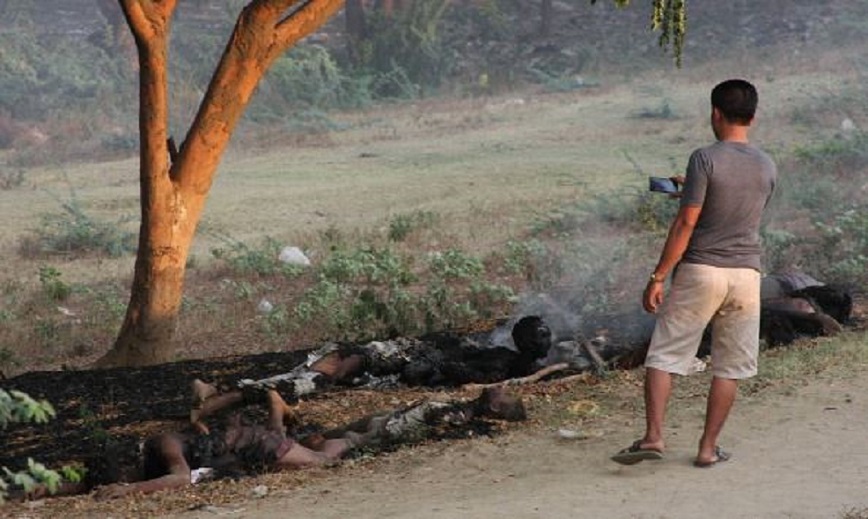
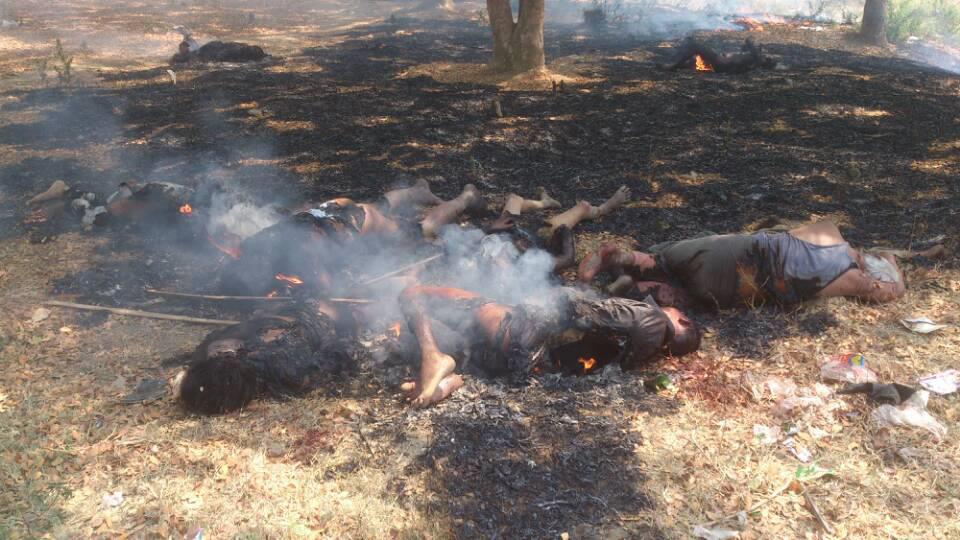
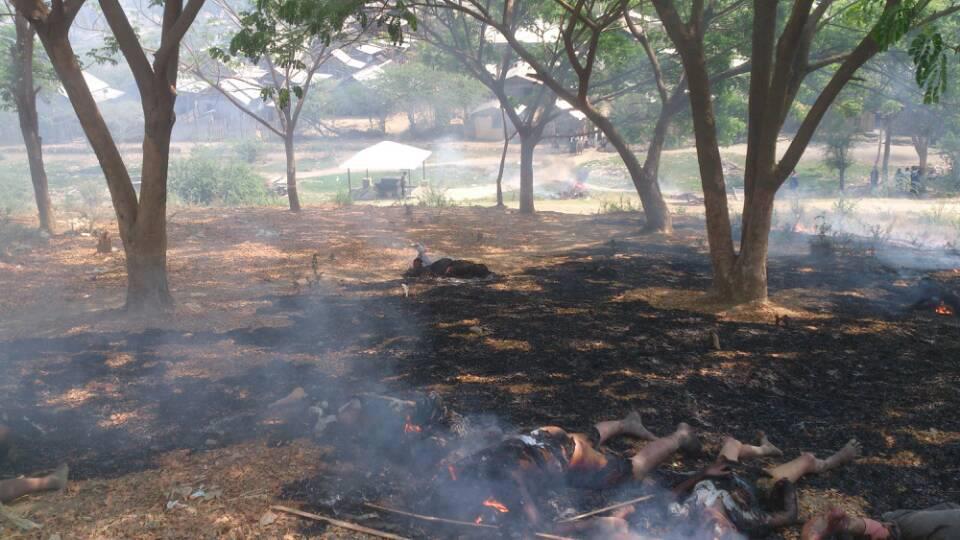 Myanmar’s
army is burning down villages and shooting Rohingya Muslim civilians as
part of an alleged crackdown on insurgents in the Muslim-majority
Rakhine state, witnesses have said.Understanding the Rohingya genocide,
and Aung San Suu Kyi's deadly silence.The Paradox of Democracy in Aung
San Suu Kyi’s Myanmar.
Myanmar’s
army is burning down villages and shooting Rohingya Muslim civilians as
part of an alleged crackdown on insurgents in the Muslim-majority
Rakhine state, witnesses have said.Understanding the Rohingya genocide,
and Aung San Suu Kyi's deadly silence.The Paradox of Democracy in Aung
San Suu Kyi’s Myanmar.
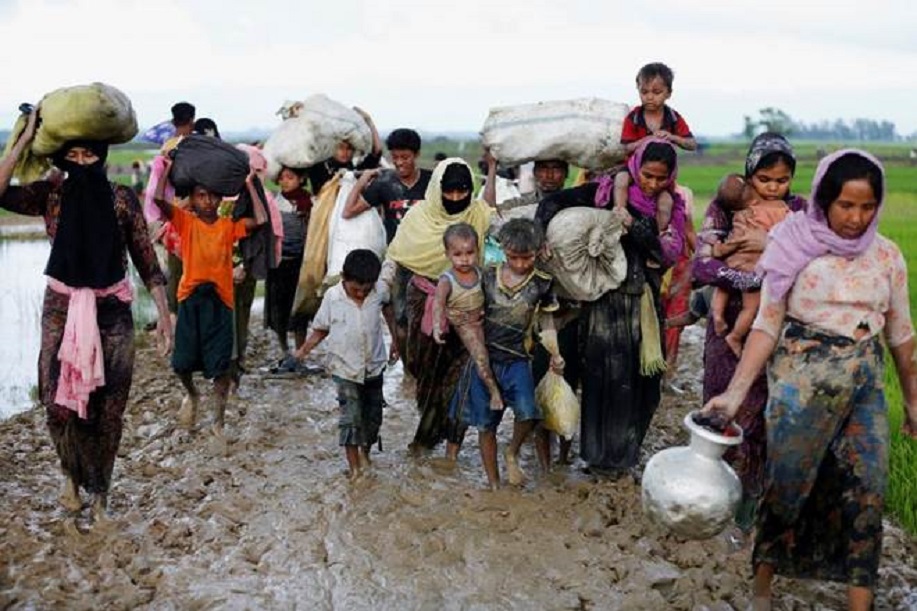
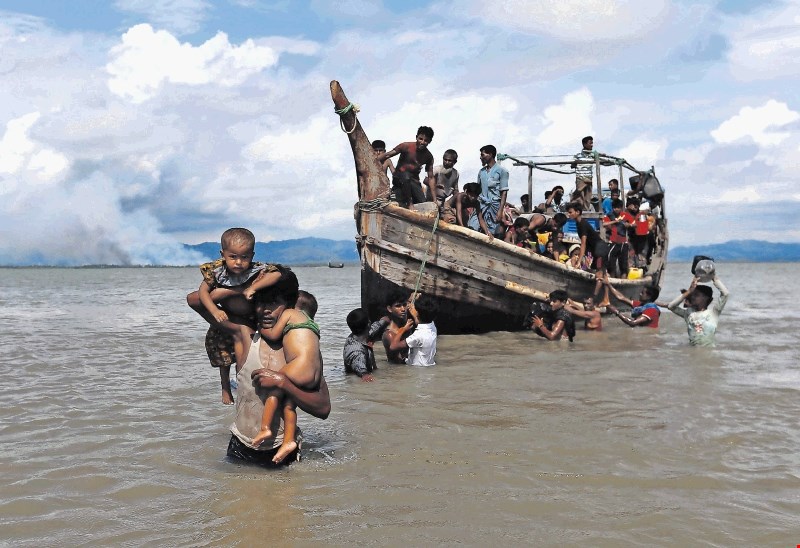
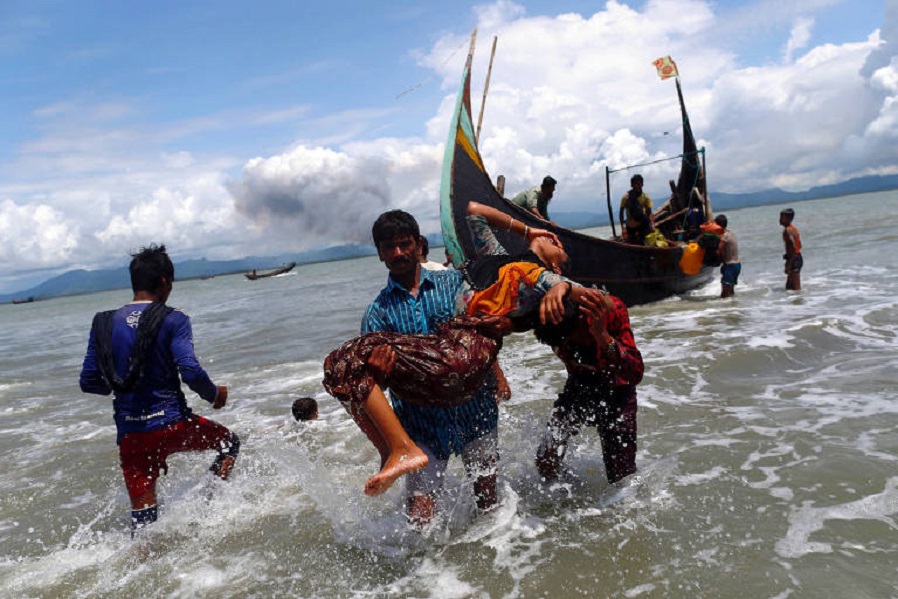 Discrimination against the Rohingya goes back to the government of Ne
Win in the 1960s, which declared them foreigners in 1982. Although the
Myanmar government has exhibited signs of reform since 2011, systematic
discrimination and persecution of the Muslim group by the Burmese
authorities continues.
Discrimination against the Rohingya goes back to the government of Ne
Win in the 1960s, which declared them foreigners in 1982. Although the
Myanmar government has exhibited signs of reform since 2011, systematic
discrimination and persecution of the Muslim group by the Burmese
authorities continues.
